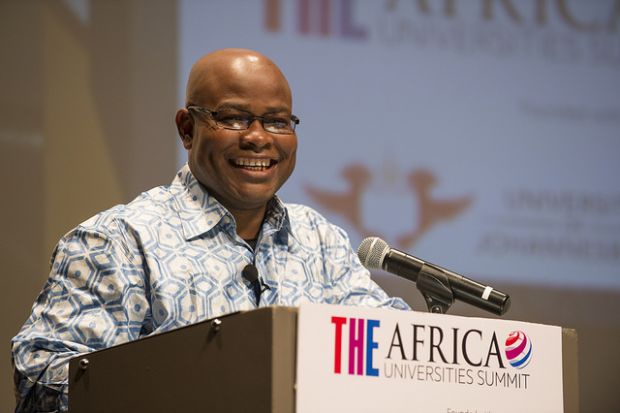African higher education should prioritise the public good over private profit to help the continent to achieve its potential, according to an expert on African development.
Adebayo Olukoshi, director of the United Nations African Institute for Economic Development and Planning, told the Times Higher Education Africa Universities Summit that for-profit provision had become “almost a defining principle” of the expansion of higher education on the continent.
He also noted that the notion of “Africa Rising” focused on the potential for economic development and the spending power of an emerging middle class. But the voices of Africans themselves are being “highly muted” at a time when inequality on the continent is rising, he added.
Professor Olukoshi said that universities “cannot afford not to be at the centre” of debates that would “determine the future destiny of our continent”.
To achieve this, universities should remind themselves “that the essence of the university rests more in the promotion of public purpose and not of private gain”, he said.
“Bringing back the public purpose in African higher education and making it central to the definition of mission and goal of the university will enable the university to claim its rightful role and place in…the mobilisation of the citizenship which we require for the renaissance of the continent,” Professor Olukoshi said.
Universities should play a key role in raising educational standards at primary and secondary level in Africa, Professor Olukoshi said. Tuition at too many schools was “completely out of sync with the kind of students professors expect to have”, he argued.
“A conversation which must take place about how to create a coherent educational system has been effectively lacking and universities must play an important role in making this happen,” Professor Olukoshi said.
More coherence of provision between different types of universities, including public and private ones, was also required, according to Professor Olukoshi, who complained that regulatory authorities “consider their role to be fulfilled once they have licensed institutions”.
The ideal was the creation of a pan-African higher education system with a standardised curriculum, Professor Olukoshi said, but he agreed that this was some way off.
In the meantime, academics should focus on “breaking down barriers to collaboration” that emerged alongside the creation of national universities in the aftermath of colonialism, Professor Olukoshi said.
“Re-establishing linkages between African universities must be an important element of the renaissance we seek to create,” he said.
Concerns about Africa Rising were echoed by Lindela Rowland Ndlovu, vice-chancellor of Zimbabwe’s National University of Science and Technology, who said that the fact that the industrialisation of the continent was being led by international conglomerates meant that the graduates and knowledge that institutions produced were often not required.
“There is something that we need to change about the whole industrialisation of our region so it is in sync with higher education production,” Professor Ndlovu said.
Professor Olukoshi agreed, saying that postgraduate programmes at African universities too often became “holding posts” for young people who were unable to find jobs and whose only other option was a life of crime.
Better funding and expertise needed to exploit innovation, says senior politician
Universities in Africa too often lack the funding and expertise that would enable them to capitalise on their research discoveries, according to a senior politician.
Peter Katjavivi, the speaker of the Namibian parliament and the former vice-chancellor of the University of Namibia, told the Times Higher Education Africa Universities Summit that nearly half the continent’s higher education institutions had no official policy on intellectual property.
This, combined with the limited amount of public funding that was directed to the sector, meant that research innovations made on the continent were often not exploited fully, making it harder to generate additional income.
Even when African universities did manage to generate income from their discoveries, most were forced to reinvest any surplus in general running costs, rather than in further innovation, Professor Katjavivi continued.
He argued that African universities should stop “narrowly concentrating” on the laboratory use of their research and should broaden their focus to include spin-out companies and patenting activity.
Professor Katjavivi, who fought for Namibian independence over nearly three decades in exile, said that governments also had an important role to play in the development of an innovation culture.
Public funding for research was “certainly justified” since it helped economic development and leveraged private investment, and governments should also set research goals for their universities, he said.
后记
Print headline: Public purpose must trump private gain




